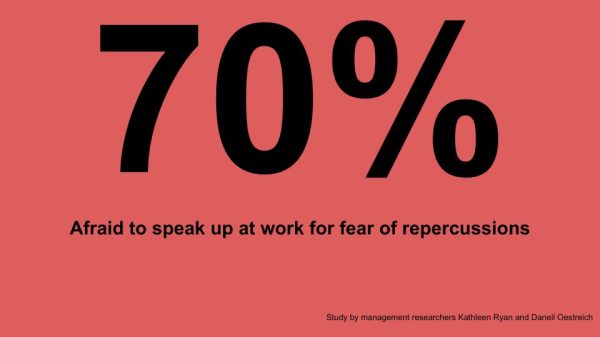Managers Should Have Opinions – Why Speaking Up is so Important

Managers should have opinions and express them. Employees should have opinions about their areas of expertise. Too many of us view expressing an opinion at work as a challenge, as a potentially dangerous move. Research has found around 70% of people were afraid to speak up at work for fear of repercussions.
I personally am not surprised this number is so high based on conversations with many employees, and I am also dismayed too. Please give me a few minutes to explain why speaking up is so important for you personally, for your career and for the business you work in.
It is scary to risk rejection of your ideas, solutions, and viewpoints. Knowing why and how to speak up at work will improve your confidence and minimise the risk of repercussions.
Speaking up at work and expressing your opinions is so important for the team you work in and the business itself. You are the expert in the area you work and so your opinion is very important. Expressing your opinion adds a lot of value to the business which in turn helps you and your career. Please give me some of your time to explain why and share how to speak up at work.
Managers Should Have Opinions – Why Speaking Up is so Important
- Why having an opinion and speaking up is so important to you personally
- How to speak up – 4 tips for speaking up at work
- When to express your opinion at work
- Different ways to challenge without offending
- Listening – the ideas and solutions supercharger

Watch on YouTube
Listen on Podcast
Why having an opinion and speaking up is so important
Every business is desperate for great ideas and solutions and then for team members to implement chosen solutions successfully. Creating ideas and solutions in a business is incredibly valuable and essential for any company to survive and hopefully thrive.
You have a very valuable contribution to make, no matter your position. You will have ideas and solutions for problems you encounter doing your job. If you don’t voice your opinion at work, your team and your company won’t benefit from your unique perspective, or get the benefit of your unique combination of skills and experiences. Your different perspective creates value for the team and company.
By creating value, you are increasing your chances of promotion. I my view, managers should express opinions – it is part of the job. I will cover how to have an opinion, an informed considered opinion a little later.
Leadership, in my view, is about taking risks and making change for the better happen. Anyone can lead. You have to speak up to influence, to earn respect and to improve team performance.
Finally, by voicing your opinion, you are creating and controlling your personal brand. Your views, ideas and solutions and what you do with them all contribute. If you stay silent or don’t express your opinions, then you won’t have a brand or others will create one for you.
Speak up and get noticed. Add value to your business through expressing your opinion, ideas, and solutions and get promoted a lot more quickly.

How to speak up – 4 tips for speaking up at work
Speaking up when you are not confident to do so is scary. What if I say something wrong? What if I look silly? What if other people dismiss my opinions and ideas?
Use these tips to overcome your initial nerves and build your confidence to speak out.
Firstly- do your homework.
This is true whenever you are expressing your opinion at work. The more your opinion is considered and based in fact and insight, the more it will be listened to. So think about the issue, think about who you will be speaking to, and think about why this issue will matter to them. Use data and facts to back up your idea or solution. Both add more weight to your opinion and make it harder to dismiss.
Secondly, be diplomatic and considerate of others.
Showing care of others will reduce barriers and encourage others to listen to you and understand your point of view. Don’t try to dominant in the words you use or the body language you display. Show you are open, respectful and have considered what you are saying.
While not being dominate, it remains
Thirdly it is important to be confident
in your tone and volume of voice and in your body language. If you don’t demonstrate you believe what you are saying then why should anyone else pay attention to you. Work on getting the right balance of confidence without dominating.
Fourth, frame your opinions in terms of the key objectives of the team
function, or business. When your ideas align and support the direction of team travel and achieving team goals, more people will listen and fewer will object or dismiss what you say.
Practice using these tips for speaking up at work and you will gain confidence, making it easier to speak up in the future. Start creating this virtuous circle today.

When to express your opinion at work
When to express your opinion at work and when to keep quiet is a tough question to answer. This is very much a judgement call depending on the situation and the people involved. When you are giving your opinion also depends how well you are aligned with the majority or direction of discussion, and the impact of not expressing your opinion.
When to express your opinion at work includes
Firstly – when you are asked for your opinion.
Be diplomatic, be humble and also be honest with what you believe. Managers should have opinions and give them when asked. Team members should work to be comfortable expressing their opinion in their areas of responsibility when asked.
Secondly, when you spot a problem with an idea, solution or process.
Your opinion at work is super important in these situations, particularly when you think you have a better idea, solution or process or a change that will make the current one better.
Thirdly, express your opinion privately with your boss,
particularly when it opposes your boss’s view. You never want to embarrass your boss or make them look silly. A great safe way to challenge at work is by asking leading questions and let your boss discover the issue. An example might be:
“What would happen if XXX occurred. How would that impact to solution you outlined?”
Managers should have opinions on all their areas of responsibility and use their influence positively for the benefit of their team and the wider business.
Fourth, managers should express opinions in meetings
AND encourage everyone attending the meeting to express their opinions honestly too. If you are being invited to a meeting, contributing to that meeting is important. For managers, even more important is creating a safe relaxed atmosphere in which attendees are comfortable expressing their opinions knowing there will not be negative repercussions.
Challenging ideas, solutions and processes are also important. Learning different ways to challenge without offending enables you to add a lot more value to the team in which you work.
Different ways to challenge without offending
Knowing how to challenge your boss without offending them or putting them on a defensive footing is a really important part of teamwork. How else is your boss going to know when they are planning something that is unlikely to work or if they make wrong assumptions etc.
Asking leading questions is a great way to challenge without offending. An example “May I ask a question. I am a little confused how this process will work given that XXXX. Would you mind explaining?”
Use questions to lead the manager to realise the error you have spotted. Keep asking questions until you are sure they understand and have considered the issue you want them to.
Secondly, presenting past experiences or facts and data to demonstrate there is a problem is another good way of challenging without offending. Use facts and data to support your ideas too. Producing facts and data allow your boss to reassess. It is not you challenging their ideas but the facts and data.
Thirdly,
Ask your boss directly how they would like to be challenged.
In what way, in what settings etc. Position your desire to be able challenge as getting the best results for the team which helps your boss indirectly.
Fourth, build on your boss’s idea or solution so both of you work together to get an even better outcome. You could start with “ I understand your proposed solution is XXX AND I had an idea to improve this part of it. Can we discuss this idea?” Then go on to further develop the idea together.
Fifth – ask permission to express your opinion. This gives control to your boss and sets them up to listen. You could start with “May I challenge your idea slightly?” or “I think I have an alternative option – may I share this with you?” Manage your tone and body language carefully. Keep them calm, curious, respectful and open to suggestions.
There are so many ways to ask questions, introduce new ideas, challenge, and express your opinion without offending. Practice as many different ways you can until you find several that work well for you.
Listening – the ideas and solutions supercharger
Other very good way of expressing an opinion at work is after you have listened and considered the other person’s opinion. Actively listening and taking in what is being told to you makes the other person feel appreciated and valued. The social laws are reciprocity encourages the other person to then return the favour by listening and considering your opinion.
As a manager, I love listening to what staff tell me. Asking questions and listening helps me to encourage team members to give me their opinions on all sorts of issues. The information you get on the problems they are encountering, who is helpful within the business and who is not, what processes are broken, what is happening with this customer and that etc is a gold mine of opportunity. The opportunity to recognise the good and implementable ideas the team members have and do something useful with them – i.e. put them into action.
Create a situation in which team members are happy to express their opinions and ideas and you have 5, 10 , 20 people’s ideas to choose from rather than just your own. In my experience, that is a winning formula for any manager looking to add more value to their team and the business.
Listen to the ideas and solutions of others and give credit where it is due.

in summary
Remember, you should express your opinion at work to add more value to the team and business. How to speak up at work is key. When to express your opinion at work is equally important. Use the tips and approaches we have discussed to increase your confidence in giving your opinion at work.
Giving useful opinions – those that have been considered and use facts and data to back them up takes a little more effort on your part. Putting this effort in will significantly increase how well everyone listens to you when you express an opinion at work.
We have been through today:
- Why having an opinion and speaking up is so important to you personally
- How to speak up – 4 tips for speaking up at work
- When to express your opinion at work
- Different ways to challenge without offending
- Listening – the ideas and solutions supercharger
If you have any questions on “Managers Should Have Opinions – Why Speaking Up is so Important”, drop me an email at support@enhance.training and I will get back to you.
I still remember early in my career a senior manager explaining to me why they thought I was good compared to a peer of mind. The key reason they gave was “you tell us what you think. You have the courage to express your views and opinion and that is really valuable”.
Having an opinion is essential to standing out from the crowd. Yes, you need to do some work and thinking to have an opinion that senior managers feel is worth seeking out. Remember you are the expert in your area so you have a lot worth sharing. Spend time thinking so you have an informed opinion. As you become a manager, to be authentic, you must have your own opinions.
Jess





